Filipino Dating Terms and Acronyms are highly popular in the Philippines, not only due to the country’s warm and welcoming culture but also because of the Filipino diaspora. However, for those unfamiliar with the intricacies of Filipino online dating, its unique set of terms and acronyms can be bewildering.
In this guide, we will take a closer look at the diverse and vibrant collection of words and phrases used in Filipino online dating. These terms form a rich tapestry that combines elements of both the Filipino and English languages. This fusion creates a distinctive and unique language specific to online dating in the Philippines. By unraveling these expressions, we aim to shed light on the cultural and linguistic fusion that makes Filipino online dating terminology truly special.
Filipino Dating Terms
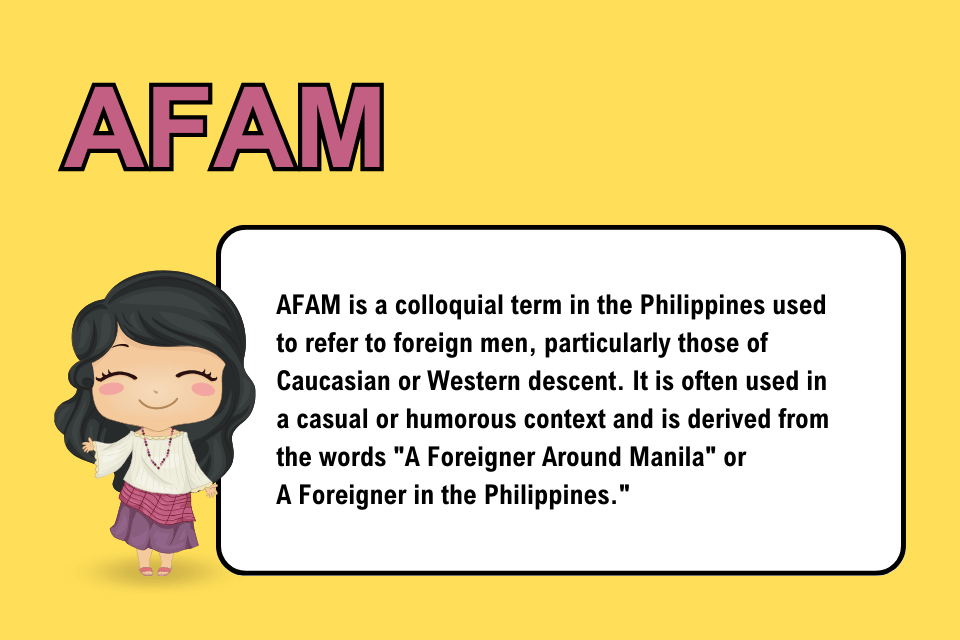
Afam – A Filipino slang term derived from the English word “a foreigner,” specifically a Caucasian or Western expatriate. In the context of dating, “afam” is often used to refer to a foreigner who is seen as attractive or desirable for dating or relationships. It’s a colloquial term used to describe someone’s preference for dating foreigners, especially those from Western countries.
Agawan-base – To flirt with someone who is already in a relationship, potentially causing complications.
Alalay – A supportive suitor who hasn’t yet reached the boyfriend or girlfriend status.
Akin ka lang – “Akin ka lang” translates to “You’re mine alone.” It’s a possessive and affectionate phrase used to express a strong desire for exclusivity and commitment in a romantic relationship.
Akin ka na lang – “Akin ka na lang” means “Just be mine.” It’s a similar expression of possessiveness and a desire for exclusivity in a romantic relationship, often used to convey a deep commitment to someone.
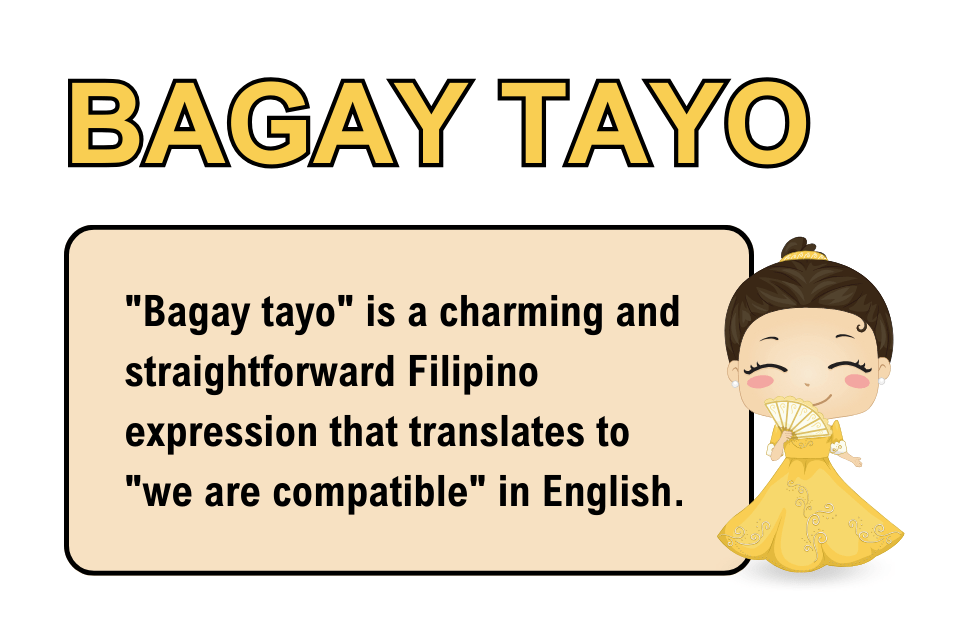
Babe – A term of endearment in romantic messages, similar to “baby” or “honey.”
Bagay tayo – “Bagay tayo” is a charming and straightforward Filipino expression that translates to “we are compatible” in English.
Basag – “Basag” is the term used to describe a breakup. It signifies the end of a romantic relationship, indicating the closure of emotional ties.
Bet – To like or be attracted to someone.
Boylet – “Boylet” is a term used to describe a young, attractive man. It is often used in a flattering manner and highlights a person’s physical appeal.
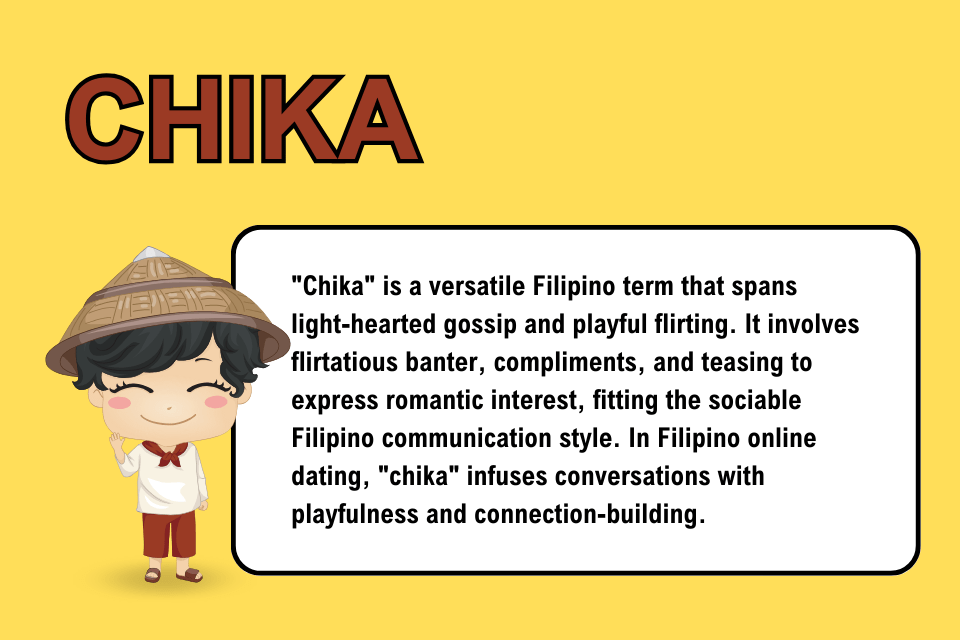
Chika – “Chika” is a versatile Filipino term that spans light-hearted gossip and playful flirting. It involves flirtatious banter, compliments, and teasing to express romantic interest, fitting the sociable Filipino communication style. In Filipino online dating, “chika” infuses conversations with playfulness and connection-building.
Crush – Someone you are attracted to romantically.
Crush ng bayan – Someone who is very popular and attractive.
Damoves – A colloquial term that combines the Filipino word “dama,” which means “to feel,” with the English word “moves,” “damoves” is used to describe someone’s actions or efforts to express romantic interest or attraction. It often refers to the subtle or not-so-subtle moves made by an individual to woo someone they are interested in romantically.
Define the Relationship (DTR) – “DTR” refers to a crucial conversation between two people involved in a romantic relationship. In this conversation, they discuss what their relationship is and what they expect from each other. It’s a significant step in clarifying the status of their relationship.
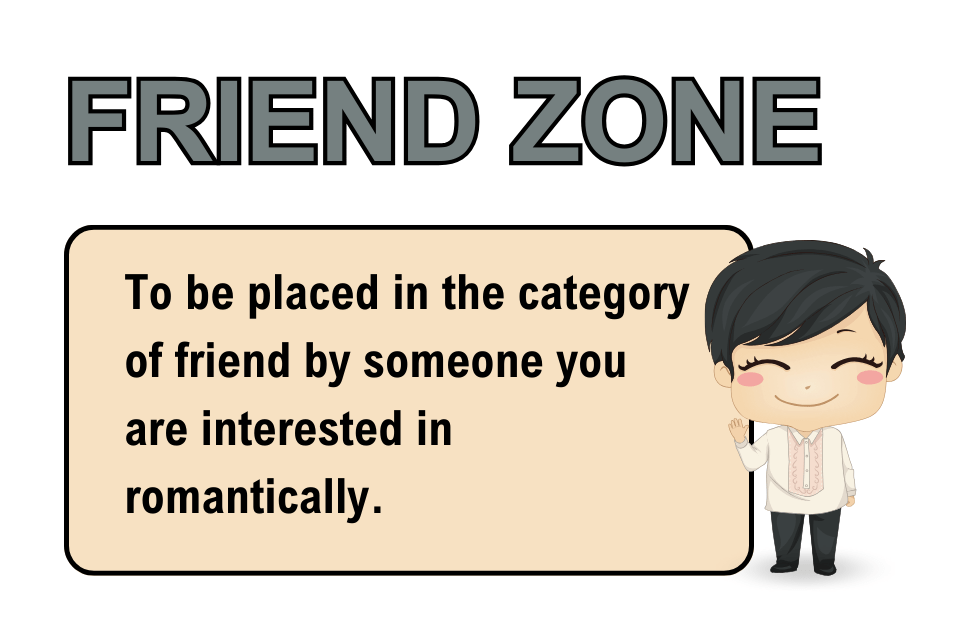
Friend zone – To be placed in the category of friend by someone you are interested in romantically.
FUBU – An acronym for “Friends with Benefits.” This term is used to describe a casual, non-committed relationship where physical intimacy is involved.
Gusto kita – “Gusto kita” translates to “I like you” or “I have feelings for you.” It’s a straightforward way of expressing romantic interest and attraction to someone in Filipino. This phrase is often used to convey one’s affection and interest in pursuing a romantic relationship.
Ghosting – To suddenly stop communicating with someone you have been dating without any explanation.
Harana – “Harana” is a charming Filipino tradition of serenading someone you are courting. It’s a heartfelt gesture to express romantic feelings and win the affection of the person you are interested in.
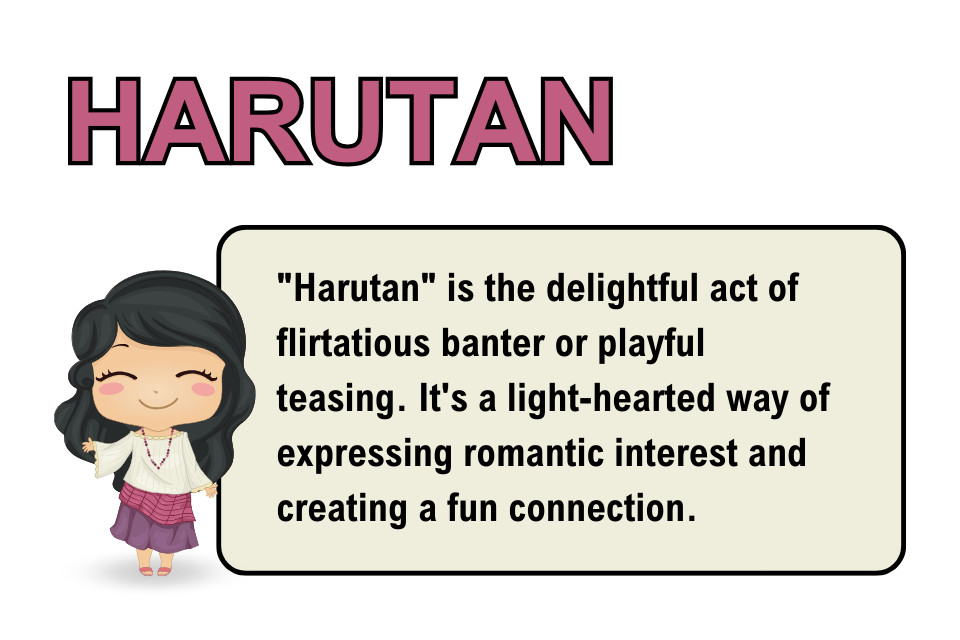
Harutan – “Harutan” is the delightful act of flirtatious banter or playful teasing. It’s a light-hearted way of expressing romantic interest and creating a fun connection.
Hook up – To have a casual sexual encounter with someone.
Hugot – “Hugot” represents deep emotional feelings, particularly related to love or heartbreak. It’s the poignant emotions that arise from personal experiences and expressions, often captured in heartfelt quotes or statements.
Ikaw na lang – “Ikaw na lang” translates to “You should be the one.” It’s a phrase expressing a preference or desire for someone to be the chosen one in a romantic context.
Ikaw na talaga – When someone declares “Ikaw na talaga,” they are affirming that you are “the one” for them. It signifies a profound romantic connection and a strong commitment.
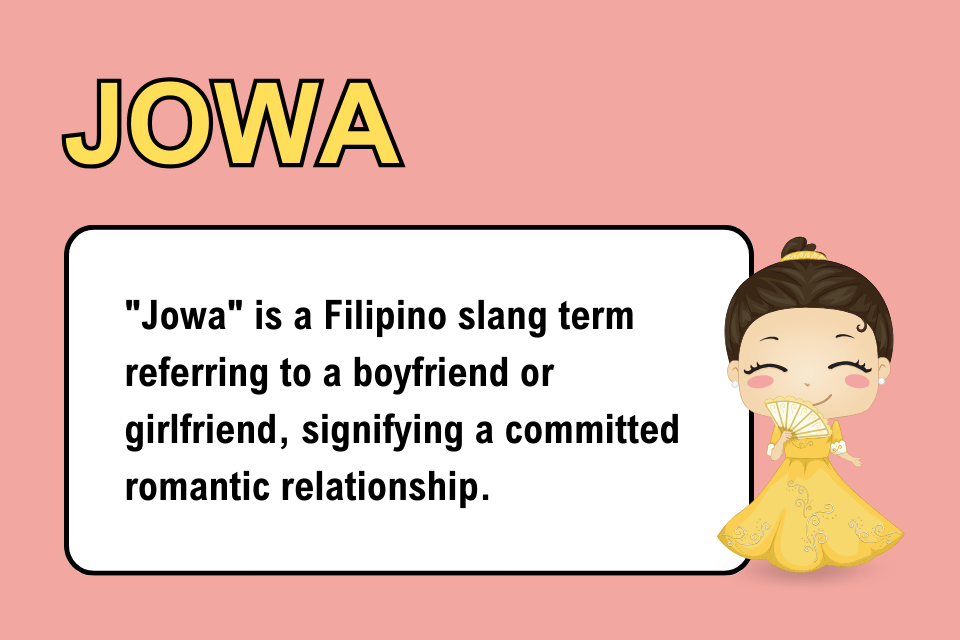
Iskor – To “iskor” means to successfully secure a date or have a sexual encounter with someone. It’s a term that celebrates reaching a romantic milestone or achieving one’s dating goals.
Jowa – “Jowa” is a Filipino slang term referring to a boyfriend or girlfriend, signifying a committed romantic relationship.
Jowaan – “Jowaan” is the act of dating someone, particularly in the early stages of a romantic relationship when both individuals are getting to know each other better and spending time together.
Kabit – A “kabit” is a mistress or lover in a relationship with someone who is already married or committed to another person. It implies a secretive and often controversial relationship.
Kilig – The feeling of giddiness or butterflies in your stomach.
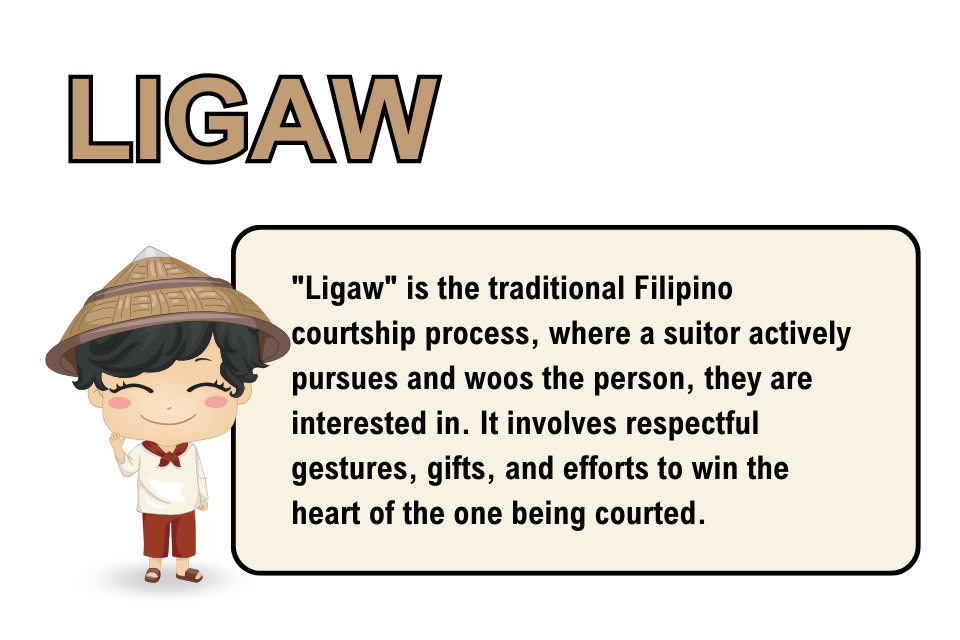
Labo – Unclear or confusing. Often used to describe a relationship that is not well-defined.
Lagi na lang ako – It’s always me. Often used to complain about being unlucky in dating.
Landi – Flirting or making romantic advances online.
Ligaw – “Ligaw” is the traditional Filipino courtship process, where a suitor actively pursues and woos the person, they are interested in. It involves respectful gestures, gifts, and efforts to win the heart of the one being courted.
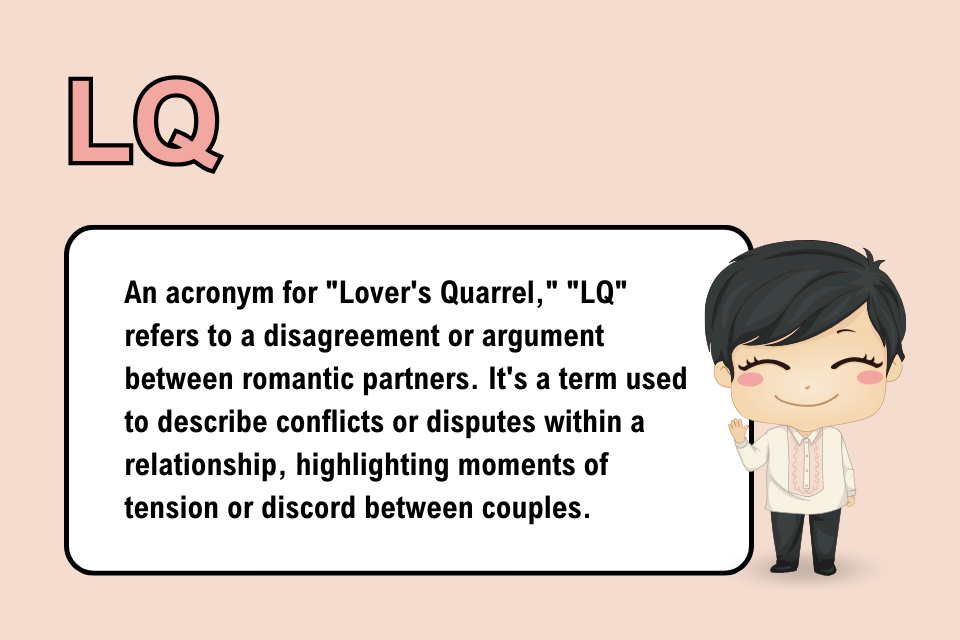
Lihim na pagtingin – “Lihim na Pagtingin” describes secret admiration. It’s the feeling of having a crush on someone without revealing your true feelings to them, often associated with hidden glances and unspoken emotions.
LDR or Long-Distance Relationship – A relationship where the two people involved are separated by a considerable distance, often requiring online communication as the primary means of interaction.
LQ – An acronym for “Lover’s Quarrel,” “LQ” refers to a disagreement or argument between romantic partners. It’s a term used to describe conflicts or disputes within a relationship, highlighting moments of tension or discord between couples.
Mahal – “Mahal” means “expensive” in Filipino, but it is also commonly used as a term of endearment, similar to “dear” or “love.” It’s often used in messages between romantic interests to express affection.
Mahal kita – “Mahal kita” translates to “I love you.” It’s a powerful declaration of love and affection in Filipino, often exchanged between romantic partners.
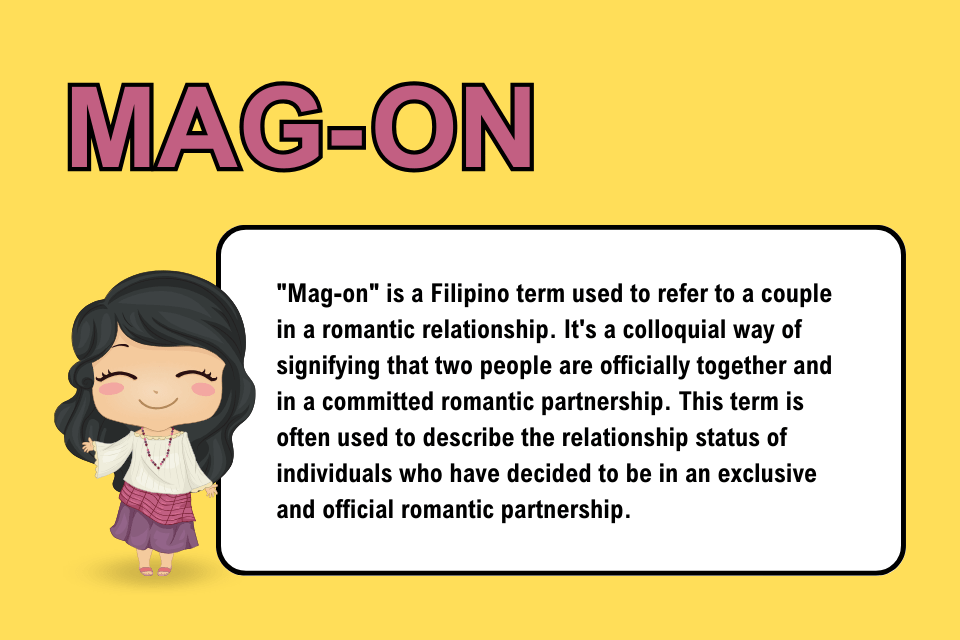
Mag-on – “Mag-on” is a Filipino term used to refer to a couple in a romantic relationship. It’s a colloquial way of signifying that two people are officially together and in a committed romantic partnership. This term is often used to describe the relationship status of individuals who have decided to be in an exclusive and official romantic partnership.
MOMOL – Make-out make-out lang, a casual relationship involving kissing.
MOMOX – Short for “Make-out make-out extreme,” “MOMOX” denotes a more passionate and intense physical relationship that goes beyond simple kissing.
Move on – To get over someone after a breakup.
Muling ibalik ang pag-ibig – To rekindle a lost love.
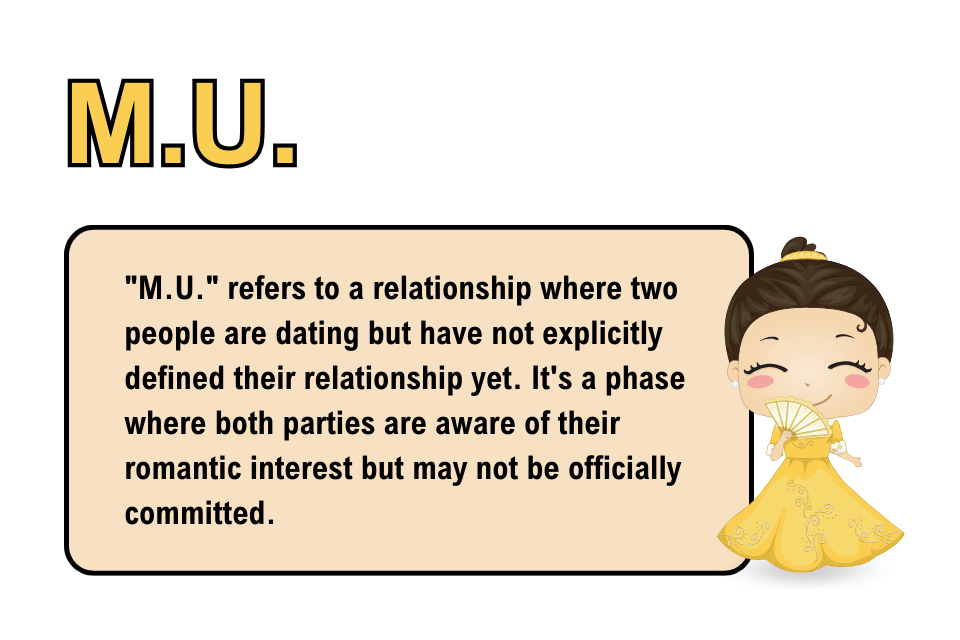
M.U. or Mutual Understanding – Similar to “DTR,” “M.U.” refers to a relationship where two people are dating but have not explicitly defined their relationship yet. It’s a phase where both parties are aware of their romantic interest but may not be officially committed.
Naghahanap ng jowa – When someone is “naghahanap ng jowa,” they are actively looking for a boyfriend or girlfriend. It’s a declaration of their desire to find a romantic partner and embark on a new relationship.
NBSB – An acronym for “No Boyfriend Since Birth,” “NBSB” describes a person who has never had a boyfriend or girlfriend throughout their life, often associated with being single by choice or circumstance.
Porma – To “porma” is to dress up or make oneself presentable in a way that impresses the person you are interested in romantically. It’s about putting your best foot forward to make a positive impression.
Red flag – A warning sign that a person is not a good match for you.
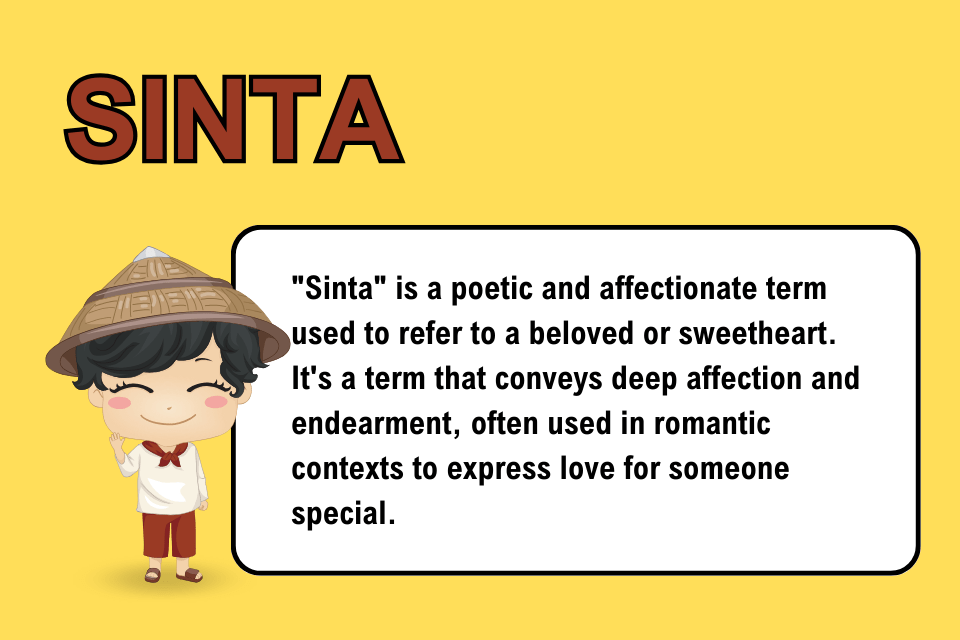
Slide into the DMs – To send a direct message to someone on social media, typically to start flirting with them.
Selos – “Selos” is the Filipino term for jealousy, a common emotion in romantic relationships. It’s important to navigate jealousy in a healthy and constructive way.
Sila na – When someone says “sila na,” it means that two individuals are now officially in a romantic relationship.
Single by choice – Choosing to be single.
Sinta – “Sinta” is a poetic and affectionate term used to refer to a beloved or sweetheart. It’s a term that conveys deep affection and endearment, often used in romantic contexts to express love for someone special.
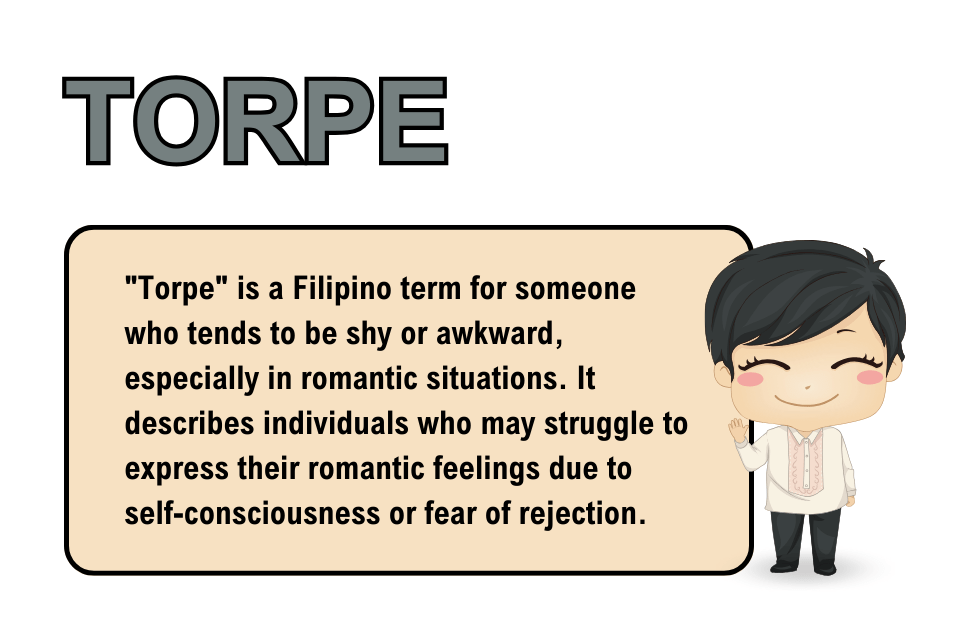
Shipping – To want two people to be in a relationship.
Tayo na – “Tayo na” translates to “Let’s be together.” It’s an expression of a desire to start a romantic relationship or take a friendship to a more committed level.
Tarantado – A jerk or a player.
Torpe – “Torpe” is a Filipino term for someone who tends to be shy or awkward, especially in romantic situations. It describes individuals who may struggle to express their romantic feelings due to self-consciousness or fear of rejection. In Filipino dating culture, being “torpe” is not necessarily negative but acknowledges someone’s reserved nature when it comes to matters of the heart.
Uy – This term serves as an attention-getting phrase used to engage someone in conversation, particularly when you’re flirting with them or attempting to initiate a connection.
Walang forever – There is no such thing as forever. A cynical view of relationships.
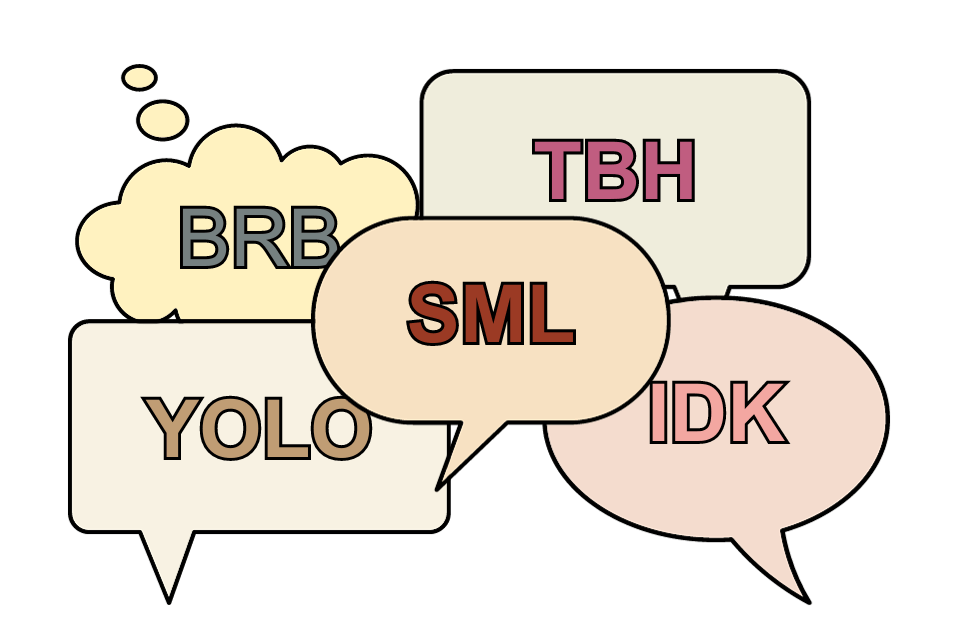
Filipino Online Dating Acronyms
BRB – Be Right Back, often used when someone needs to briefly step away from the conversation.
CTTO – Credit To The Owner, used when sharing content or information from someone else.
IDK – I Don’t Know, used when you’re unsure or don’t have an answer to a question.
LOL – Laugh Out Loud, used to indicate that something is funny.
ROFL – Rolling On The Floor Laughing, a stronger version of LOL, indicating something is extremely funny.
SML – So Much Love, expressing a deep affection for someone or something.
TBH – To Be Honest, often used when someone wants to share an honest opinion.
Y.O.L.O – You Only Live Once, used to justify taking risks or trying new experiences.
Explore the Vibrant World of Filipino Online Dating!
Use these terms and acronyms to connect and navigate the dating scene confidently.



